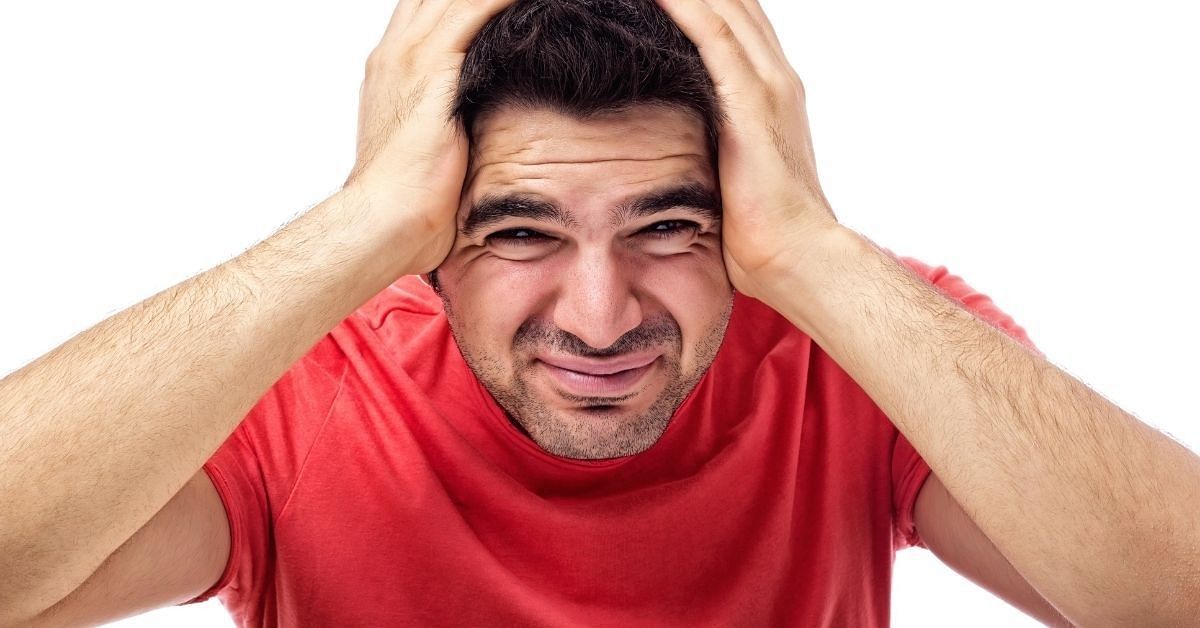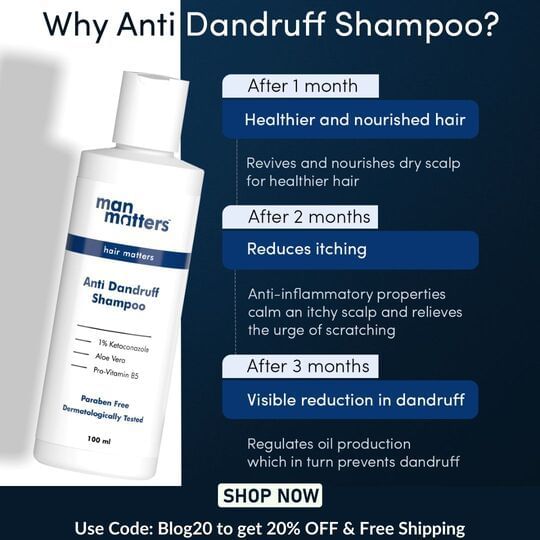Does Dandruff Cause Hair Fall? Is There a Link?

Dandruff is the most annoying yet harmless white flake (broken dead skin of the scalp). It often sheds down and gets accumulated over the clothes or on the shoulders. Despite not being a serious issue, one may face severe consequences (like itchy scalp, inflammation, or hair thinning) if you leave dandruff untreated. Although dandruff alone cannot be the reason behind the severe hair fall, they are interlinked.
Does Dandruff Cause Hair Fall?
Dandruff is quite a common hair problem, and the most common question that strikes one's mind is 'does dandruff cause hair fall?' Well, many people have dandruff and further develop hair thinning issues. But is it worth blaming dandruff for this?
Dandruff does not cause your hair to fall directly. However, there are some links between them. Dandruff causes itchiness and often ends up in vigorous scratching of the scalp.
Continuous scratching causes inflammation in the scalp, which damages the hair follicles. It further leads to premature pushing out of the hair to the telogen phase from the growth phase. Once the hair reaches the telogen phase, the hair follicles rest and the hair falls out.
Some flaky skin or dandruff conditions lead to prompt medical attention. It includes scalp psoriasis, seborrheic dermatitis, eczema, and scalp ringworm. Such medical conditions lead to hair loss.
However, dandruff increases the risk of hair loss in people suffering from androgenic alopecia, a condition causing female or male-pattern baldness.

What Can Cause Both Dandruff and Hair Loss?
Any situation causing the outer skin layer to shed out at a fast rate causes dandruff. If remaining untreated, it can cause hair fall due to dandruff. However, some conditions cause both dandruff and hair loss. These are:
1. Scalp Psoriasis
Psoriasis is an autoimmune condition that affects the scalp, developing itchiness and scaly patches. Although it is not dandruff, it may develop the same dandruff-like symptoms. One may witness baldness where the scaly patch develops.
2. Fungal Infections
Ringworm causes intense itching, wherein one may notice dry flakes or blisters due to severe inflammation. It leads to hair falling in clumps. Similarly, other fungal infections also cause dandruff symptoms and hair loss. Antifungal treatments help treat these conditions.
3. Seborrheic Dermatitis
This medical condition can affect any body part. However, it majorly impacts the scalp, causing red or greyish scaly rashes. The rashes cause severe itchiness and greasy patches. Moreover, continuous scratching increases the risk of damaging hair follicles.
4. Folliculitis Decalvans
It is a rare inflammatory disorder destroying the hair follicles. One may even develop itchy red patches on the scalp. The itchiness gives the illusion that dandruff causes it. However, if left untreated, it may lead to severe hair fall.

5. Lichen Planopilaris
It develops dry, flaky, and rashes over the scalp, causing the hair to fall out in clumps. The symptoms are similar to dandruff, but anti-dandruff treatments would not help treat this condition. It would be wise to consult a dermatologist for such conditions.
How to Prevent Hair Loss From Dandruff?
One needs to know what causes dandruff and hair loss before taking preventive measures. It is because several reasons lead to dandruff and hair loss. Hence, if you are aware of the causes, one may know whether it is mandatory to address the dermatologists or not, or home remedies would be sufficient. Here are some ways to prevent hair fall due to dandruff:
1. Add Moisture to Your Hair
Lack of moisture often sheds out the dry skin, which gets accumulated on the scalp. Make sure you keep the scalp hydrated with a sulphate-free conditioner. Using conditioner becomes highly essential when you use medicated shampoos containing salicylic acid. It is often drying when used regularly.
Massaging the scalp with coconut oil helps keep it moisturised and contains antifungal properties. Even a 2015 study shows that the antifungal activity of coconut oil is similar to ketoconazole, which is a vital ingredient in anti-dandruff shampoos.

2. Avoid Irritable Hair Products
Hair dyes and similar hair products contain chemicals irritating the sensitive scalp. It leads to contact dermatitis. Generally, fragrances and preservatives in these products cause contact dermatitis. Avoid hair products containing formaldehyde, bleach, artificial or natural fragrance, or detergents. If you do not notice any reaction, it would be better to change your hair-care regimen if you witness dandruff.
3. Manage Stress
Although stress does not cause dandruff directly, it weakens the body's immune system. It often makes the scalp more sensitive to the naturally occurring fungus called Malassezia.
One can manage stress by practising relaxation techniques, like meditation and yoga. Mild walking around the blocks or controlled breathing exercises also helps a lot.
4. Avoid Aggressive Brushing or Twisting
One must avoid aggressive brushing, twisting, and scratching the hair. If the itchiness is intolerable, consult a dermatologist to prevent the occurrence of inflammation and blisters. Moreover, aggressive brushing damages the hair follicles, which may cause hair to fall.
5. Try Some Home Remedies
Although there aren't any proven results claiming home remedies, it is beneficial for treating hair fall due to dandruff.
- Aloe vera: It has an anti-inflammatory and highly soothing effect on the scalp. Cut the aloe vera into two halves and apply the juice over the scalp. Leave it on for 15 minutes and rinse it off.
- ACV: Apple cider vinegar helps shed the dead skin cells, balances the scalp's pH level, and fights fungal infection. One can combine apple cider vinegar with oil or shampoo or dilute one cup of ACV with a cup of water. Use this mixture as a final rinse after shampooing.
- Tea tree oil: Tea tree oil has anti-fungal and anti-inflammatory properties that help combat dandruff and itchy scalp. Use a few drops of tea tree oil with a carrier oil, like coconut oil or olive oil, and massage your scalp and hair with this mixture.

Is Hair Loss Due to Dandruff Temporary or Permanent?
Hair loss due to dandruff is not permanent. In other words, the hair follicles get restored and start growing once you treat your dandruff hair. Hence, even if you witness some hair fall issues, one may restore the hair growth while including a good hair care regimen.
Untreated dandruff leaves your scalp unhealthy, limiting the blood and nutrients flow to the follicles. When you treat dandruff and keep the scalp healthy, it helps restore stunted growth.
Does Hair Fall Due to Dandruff Grow Back?
Yes, the hair fall due to dandruff grows back if one rectifies dandruff. The lost hair grows back if the scalp is clean and does not have dandruff in its scalp. However, it is not magic that would spell in a day.
One needs to be patient, calm, and follow all preventive measures to restore the lost hair. A balanced diet, proper hair-care routine, and correct hair products would help restore hair growth.
Bottomline
People often mistake different scalp conditions (usually itchiness and flaky skin) with dandruff. Although it is not a direct cause of hair fall, it constantly accelerates it. Consult the dermatologist if you witness severe itchiness or hair falls in clumps. Correct medication and an optimum hair-care routine would surely help you eliminate dandruff and hair fall issues.
References
- HOW TO TREAT DANDRUFF - https://www.aad.org/public/everyday-care/hair-scalp-care/scalp/treat-dandruff
- Beena Shino, 2016; Comparison of Antimicrobial Activity of Chlorhexidine, Coconut Oil, Probiotics, and Ketoconazole on Candida albicans Isolated in Children with Early Childhood Caries: An In Vitro Study - https://www.hindawi.com/journals/scientifica/2016/7061587/
- Can stress cause hair loss? - https://www.mayoclinic.org/healthy-lifestyle/stress-management/expert-answers/stress-and-hair-loss/faq-20057820
- Mara Therese Padilla Evangelista MD, The effect of topical virgin coconut oil on SCORAD index, transepidermal water loss, and skin capacitance in mild to moderate pediatric atopic dermatitis: a randomized, double-blind, clinical trial - https://onlinelibrary.wiley.com/doi/10.1111/ijd.12339

